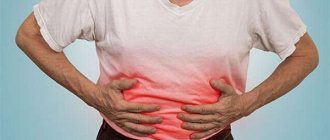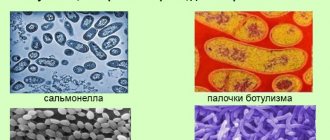Doctors distinguish diarrhea not as an independent disease, but as one of the signs of the underlying disease. Diseases of the gastrointestinal tract are characterized by various unpleasant symptoms that cause a lot of discomfort. Diarrhea due to gastritis or peptic ulcer of the stomach and duodenum is the exception rather than the rule. However, this unpleasant phenomenon can accompany gastrointestinal diseases when certain provoking factors occur.
Stomach diseases can be accompanied by nausea, vomiting and pain. Diarrhea can also accompany gastritis and ulcers, but in exceptional cases. The appearance of diarrhea during gastritis most often indicates a violation of the dietary regime. How to treat an unpleasant symptom, and are there effective folk recipes for these purposes?
Causes and symptoms of diarrhea
Gastritis is an inflammation of the gastric mucosa, which causes disruption of the entire digestive system. The main causes of diarrhea are: dietary disorders and intoxication. Experts say that diarrhea occurs in the following ways:
- Gastrointestinal diseases may be accompanied by insufficient secretion of gastric juice.
- As a result, a person has difficulty digesting food.
- Food that has not had time to be digested stagnates in the epigastrium.
- As a result, fermentation and rotting of the residues occurs.
These factors cause nausea and vomiting, as well as bowel dysfunction. Diarrhea with gastritis in some cases occurs up to 3 or more times a week. Stool disorders due to gastrointestinal diseases can also be characterized by constipation. Against this background there are:
- constant weakness;
- weight loss;
- apathetic state;
- temperature increase;
- flatulence;
- deterioration of skin condition.
As you know, gastritis is accompanied by increased, decreased or normal acidity. With a low level of gastric juice, food is not completely digested, which is the main cause of diarrhea. With gastritis with high acidity, doctors also often observe stool abnormalities. However, in such situations, constipation is more common than diarrhea. Diarrhea with this type of gastritis can develop against the background of dysbiosis or infection by the bacterium Helicobacter pylori.
The causes of diarrhea can also be: food poisoning, intestinal infection, serious nutritional disorders, acute pancreatitis or cholecystitis.
Remember that diarrhea is a symptom not only of gastritis, but also of problems with the intestines, pancreas, liver, and gall bladder. Do not diagnose yourself; consult a doctor.
Ulcer treatment regimen
First line Helicobacter pylori eradication scheme:
- Double dose proton pump inhibitor twice daily (eg 40 mg omeprazole or esomeprazole twice).
- Clarithromycin 500 mg twice daily or Josamycin 1000 mg twice daily.
- Amoxicillin 1000 mg 2 times a day.
- De-nol 240 mg twice a day.
Scheme of the second row (in the absence of FGD dynamics of ulcer size)
- Proton pump inhibitor in double dose 2 times a day (same as scheme 1)
- De-nol 240 mg twice a day.
- Metronidazole 500 mg three times a day.
- Tetracycline 500 mg 4 times a day.
Before starting therapy, Helicobacter pylori is detected using an immunological blood test (antibodies to the pathogen). Control – detection of Helicobacter antigens in feces. The urease breath test is not very informative.
The duration of eradication therapy is from 10 to 14 days. If treatment is ineffective with sequential regimens 1 and 2, Helicobacter pylori is typed and its sensitivity to drugs is determined.
Today, regimens with levofloxacin can only be used in regions of the Russian Federation where Helicobacter remains sensitive to this drug.
If duodenal ulcer is not associated with Helicobacter pylori infection, then treatment is carried out with medications that reduce the production of gastric juice. After 7-14 days of combination therapy, treatment is prescribed for another five weeks.
Duration
Diarrhea with gastritis can be short-term or long-term.
Short-term diarrhea usually goes away within 3-4 days. The main reason for its appearance is a violation of the usual diet, in particular:
- expired products;
- untreated water;
- food allergy.
Also, short-term diarrhea can be triggered by nervous tension or stress. You can get rid of it by eliminating the provoking factor.
A long-term form of stool disorder lasts from 5 days or more and is very dangerous for the body. Long-term diarrhea provokes dehydration, which only worsens the patient's condition. In addition to diarrhea, you feel:
- nausea;
- severe pain in the epigastric region;
- dizziness;
- vomiting
This type of stool disorder cannot be ignored, since the general state of health will further deteriorate. At the first symptoms, immediately contact a specialist to identify the root cause by conducting a full examination.
How is the diagnosis carried out?
The disease should be treated only after diagnosis. Self-medication is dangerous for your health! If diarrhea does not go away on its own within a few days, then it makes sense to make an appointment with a specialist.
The following examination methods are used for diagnosis:
- Ultrasound of the digestive tract;
- in some cases, gastroscopy using a probe;
- For a more complete picture, you will need to do a general analysis of blood, stool and urine (stool analysis will show the presence of blood spots).
Blood and pus most often accompany diarrhea with a duodenal ulcer.
After completing the required diagnostic procedures, the doctor evaluates the results, prescribes treatment and, if necessary, sends for additional studies.
Treatment of duodenal ulcers with antibiotics
Antibiotic therapy for peptic ulcers has appeared since the undoubted participation of Helicobacter pylori microorganisms in the development of the disease was proven. In the early stages of the use of antibiotics, it was believed that the war should be waged until a victorious end, that is, the complete disappearance of the microbe, which was confirmed by culture, a urease test during FGDS, or a blood test for antibodies to the bacterium.
Re-infection is also possible when using someone else's or shared utensils and the same FGDS, which therefore must be performed only according to strict indications.
However, today it is advisable to carry out one or two courses of therapy with antibacterial drugs (amoxicillin, clarithromycin or tetracycline) for proven Helicobacter infection. If after one course of antibiotics the bacteria are not killed, then this drug is not worth repeating. A different treatment regimen is selected.
Does diarrhea occur with peptic ulcer disease?
Many patients suffering from gastrointestinal diseases are interested in whether diarrhea can be caused by a gastric ulcer or whether it occurs for other reasons. In fact, diarrhea does occur in this condition, and even often. Doctors associate it with a violation of the acidity level in the small intestine.
Diarrhea with duodenal ulcer is observed after almost every meal, so sometimes a person may assume that he has an intestinal infection. Normal loose stools with an unpleasant odor indicate a chronic form of the disease. The acute stage is characterized by the following manifestations:
- bleeding and purulent discharge from the anus;
- stool with a mushy consistency;
- as it progresses, thick mucus is added to the main symptoms;
- Low blood pressure is observed and fainting becomes more frequent.
Diarrhea due to stomach and duodenal ulcers can alternate with constipation. Frequent urge to bowel movement is accompanied by bleeding. Treatment of this condition is mandatory, otherwise, you will face frequent relapses and the development of more serious consequences.
Diet
Although peptic ulcer disease already requires adherence to a diet, in case of diarrhea the diet should be reviewed again. The menu should temporarily not contain the following products:
- fresh vegetables and fruits;
- baking;
- fatty foods;
- any sweets.
The diet may include the following foods and dishes:
- vegetable purees;
- crackers;
- mashed porridge;
- lean soups;
- boiled lean meat;
- jelly.
Herbal infusions and decoctions relieve inflammation in the mucous membrane and help consolidate stool.
A routine examination by a doctor will help diagnose a violation of the integrity of the mucous membrane of the digestive tract in the early stages. Following a diet and using all medications prescribed by the doctor will minimize digestive disorders and avoid diarrhea.
Doctors distinguish diarrhea not as an independent disease, but as one of the signs of the underlying disease. Diseases of the gastrointestinal tract are characterized by various unpleasant symptoms that cause a lot of discomfort. Diarrhea due to gastritis or peptic ulcer of the stomach and duodenum is the exception rather than the rule. However, this unpleasant phenomenon can accompany gastrointestinal diseases when certain provoking factors occur.
Stomach diseases can be accompanied by nausea, vomiting and pain. Diarrhea can also accompany gastritis and ulcers, but in exceptional cases. The appearance of diarrhea during gastritis most often indicates a violation of the dietary regime. How to treat an unpleasant symptom, and are there effective folk recipes for these purposes?
Medication therapy
If the diagnostic results show that the cause of diarrhea is gastrointestinal diseases, the doctor will prescribe a treatment regimen to combat these diseases:
- Diarrhea can be caused by the parasitic activity of the bacterium Helicobacter pylori. If the examination reveals such a reason, the doctor prescribes a course of antibacterial agents. Only long-term medication can suppress the dangerous microorganism and prevent relapse.
- Treatment also consists of restoring the secretory function of the stomach. After all, it is the violation of secretion that leads to an exacerbation of the condition. In such cases, specialists prescribe drugs that block acid production: Omeprazole, Lansoprazole, Pantoprazole and others.
- Drugs such as Mezim, Festal, Pangrol, Creon and others can help the stomach digest food.
- Antacids are often prescribed (Almagel, Phosphalugel, Maalox, etc.)
- If spasms are observed, then antispasmodics are added to the list. The dosage and duration of the course are determined by the doctor.
If diarrhea appears as a result of a poor diet, intestinal infection, or is one of the symptoms of gastritis or ulcers, the doctor will suggest the following medications:
- To avoid dehydration during severe diarrhea, you can take an antidiarrheal agent (Filtrum, Loperamide).
- Short-term diarrhea requires restoration of the body's water-salt balance caused by intoxication. For these purposes, Regidron is prescribed. Directions for use: Dilute 1 sachet in 1 liter of boiled water and drink a tablespoon after 5-10 minutes.
- Enterosorbents will help overcome general intoxication of the body: Polyphepan, Enterosgel, activated carbon tablets.
- For very serious intestinal infections, antibiotics are sometimes prescribed. However, self-medication with antibacterial drugs without a doctor’s prescription can only worsen the patient’s condition.
- Prolonged diarrhea can cause disturbances in the microflora of the gastrointestinal tract. Medicines based on lactose and bifidobacteria, which prevent the proliferation of pathogenic organisms and restore the balance of intestinal microflora (Bifidumbacterin, Bifiform, Linex, Acilact), will help eliminate dysbiosis.
Remember that only a specialist can choose the appropriate treatment based on the research conducted.
Traditional recipes to combat diarrhea
In the treasury of folk knowledge there are very effective methods that help overcome diarrhea and do not harm the stomach:
- For example, you can apply the following fee: 2 tbsp. l. blueberries, 3 tbsp. l. sage leaves, 1 tbsp. l. immortelle fruits and caraway seeds, cinquefoil roots per 1 liter of boiling water. Mix the ingredients together and add liquid. It is best to use a thermos to prepare the infusion. The medicine can be used after 6 hours.
- Chamomile has long been famous for its anti-inflammatory properties. To treat diarrhea, you can prepare a medicinal decoction based on it: 1 tbsp. l. chamomile, St. John's wort, plantain per 250 ml of boiling water. Mix the ingredients in an enamel bowl and leave for 2 hours. Once time has passed, strain the medicine through cheesecloth. Take it according to this scheme: ½ glass 15 minutes before meals.
- You can also take tincture of peeled walnuts. Peel one kernel and pour a glass of boiling water. Leave for about 30 minutes and drink the medicine in one dose before meals.
- Healthy and medicinal juice is obtained from potatoes, carrots and beets. To prepare it, you will need one root vegetable at a time, which you need to peel and wash. Place vegetables in a juicer and get a healing drink. Drink it 2 tbsp. l. every 3 hours. You can take the juice without harm to your health for 1.5 months.










